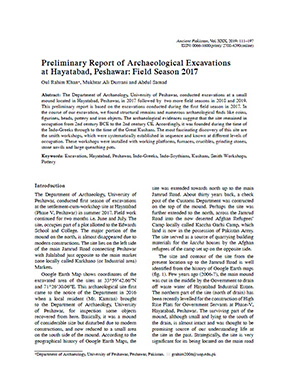Preliminary Report of Archaeological Excavations at Hayatabad, Peshawar
Field Season 2017
Keywords:
Excavation, Hayatabad, Peshawar, Indo-Greeks, Indo-Scythians, Kushans, Smith Workshops, PotteryAbstract
The Department of Archaeology, University of Peshawar, conducted excavations at a small mound located in Hayatabad, Peshawar, in 2017 followed by two more field seasons in 2018 and 2019. This preliminary report is based on the excavations conducted during the first field season in 2017. In the course of our excavation, we found structural remains and numerous archaeological finds like coins, figurines, beads, pottery and iron objects. The archaeological evidences suggest that the site remained in occupation from 2nd century BCE to the 2nd century CE. Accordingly, it was founded during the time of the Indo-Greeks through to the time of the Great Kushans. The most fascinating discovery of this site are the smith workshops, which were systematically established in sequence and known at different levels of occupation. These workshops were installed with working platforms, furnaces, crucibles, grinding stones, stone anvils and large quenching pots.

Downloads
Published
How to Cite
Issue
Section
License
Copyright (c) 2019 Ancient Pakistan

This work is licensed under a Creative Commons Attribution-NonCommercial 4.0 International License.
All Rights Reserved © Department of Archaeology, University of Peshawar




